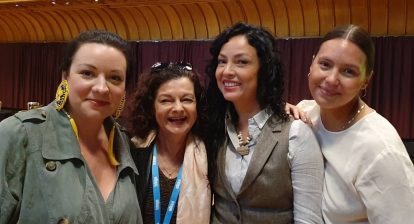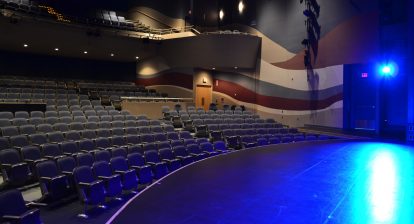January 10, 2013 – 92% of Canadians believe that arts and culture make a community a better place to live.
This is one of the findings from the Arts and Heritage : Access and Availability report released by Canadian Heritage yesterday. This survey, the fourth of its kind, was administered by phone to 1,001 Canadians in June and July 2012.
The arts provide a range public benefits
The survey report provides useful information on the perceptions of the individual and community benefits of the arts by Canadians. Canadians believe that:
- arts experiences are a valuable way of bringing together people from different languages and cultural traditions (92%);
- arts are an important way of helping people think and work creatively (92%);
- exposure to arts and culture is important to individual well-being (90%);
- the arts and culture help us express and define what it means to be Canadian (87%);
- the arts and cultural activities are important to a community’s economic well-being (86%).
These findings reinforce the notion that the arts and culture are a public good, even for non-attendees. CAPACOA’s own Value of Presenting study has come to very similar conclusions, and notably discovered that 2 in 3 Canadians (65%) believe that the community as whole benefits more or as much as individual attendees from the presentation of the performing arts (and this was no less true of non-attendees).
Performing arts facilities are important, but there aren’t enough of them
The Arts and Heritage survey also provided further evidence of the high perceived value of performing arts venues: 86% of Canadians feel that live performance spaces in their community contribute to quality of life. Performances spaces came out strong comparatively to other types of venues, being second only to libraries (94%). Canadians however had mixed feelings regarding the quality and availability of these venue. Just over half (53%) rate positively the quality of arts and culture facilities. Only 43% said the number of facilities in their community is good or very good.
Canadians remain more likely to attend performance at a performing arts facility (71%) than in other types of venues. However, a growing number of Canadians (67%) are attending performance outdoors such as at an outdoor stage, at a park or in the streets.
Canadians support government involvement in the arts
Nine in ten Canadians (90% each) expressed agreement with governments providing support for the arts and culture and promoting awareness of events and activities. These numbers are comparable to those from previous editions of this survey. However, an interesting question about the role of government in ensuring that attendance is affordable was removed from previous questionnaires. The 2007 survey had found a high level of agreement for this type of support (89%), but only 47% thought that the government was actually doing it well.
Other observations and perspectives
- The survey found that 63% of Canadians had attended live art performances during the previous year. This is lower than other recent measures of breadth of attendance found in The Value of Presenting study (75%) and in the General Social Survey (Statistics Canada, 2010) (73%). Notes: besides important methodological differences, the latter two surveys reported on performing arts events and cultural festivals, whereas the figure from the Arts and Heritage survey doesn’t include festivals. Taken individually, attendance at arts or cultural festivals was found to be higher in the Arts and Heritage survey (52%) than in the other two surveys (29% and 37% respectively).
- Quebec residents were more apt to have attended an arts or cultural festival (62% vs. 46-51% of others). No statistical differences were observed in the two other surveys.
- 40% of Canadians viewed or listened to an arts performance, exhibition or work of art via Internet during the previous year. Comparatively, 46% reported having viewed or listened to a performance in The Value of Presenting study.
- The series of attitudes questions in the survey included statements around the notions of identity and sense of belonging: “Arts/culture help us express and define what it means to be Canadian” (87% agreed) and “Arts/heritage experiences help me feel part of my local community” (77%). Comparatively, The Value of Presenting study found a bit more resonance in the notions of belonging and pride than that of identity. Elsewhere, Does Money Matter (Centre for the Study of Living Standards, 2010) found that the sense of belonging to the local community was strongly correlated to self-assessed happiness rating, and that this was particularly true in Atlantic provinces. Interestingly, the Arts and Heritage survey also noted that “Atlantic Canadians were more likely to agree that arts and heritage experiences help them feel a part of their local community (88% vs. 75-77% of others)”.
For more complete statistical information from these and other studies, visit our Field Information page.
Prepared for CAPACOA, by Frédéric Julien
Previous and Related News Articles
Renewal of Canadian Heritage Programs: Understanding our Role
CRA Releases New Guidance on Arts Activities and Charitable Registration




